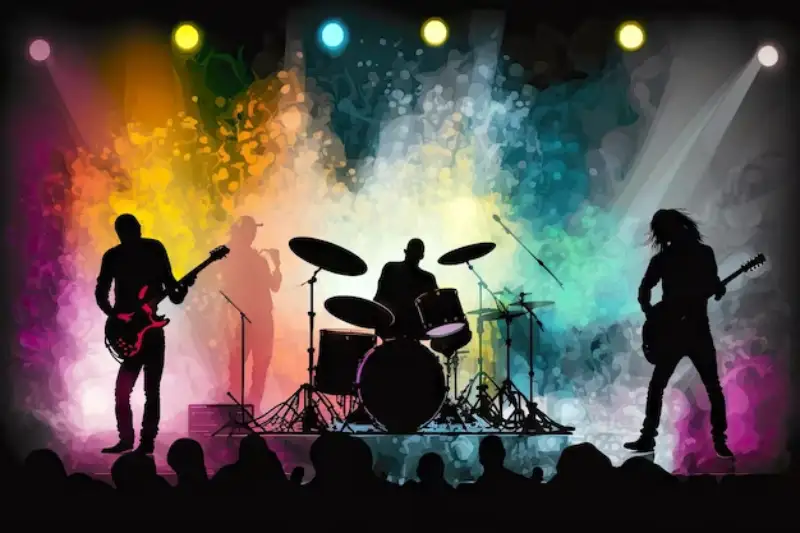Throughout the annals of music history, certain names echo with an aura of controversy so palpable it’s almost a tangible part of their legacy. From the godfathers of shock rock bands to the enigmatic maestros of pop, these artists have stirred the pot, challenging societal norms, pushing the boundaries of decency, and in the process, reshaping the landscape of modern music. Today, let’s crank up the volume on the tales of such artists and their unusual antics amplified in the limelight.
Ozzy Osbourne: The Prince of Darkness
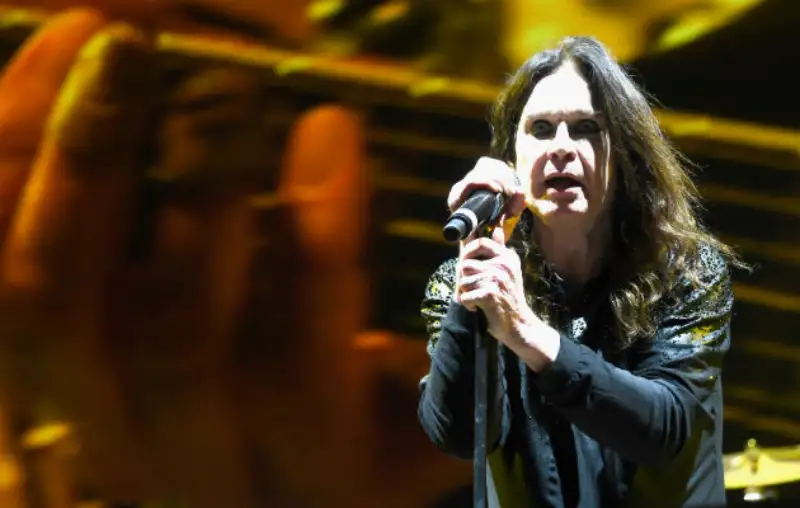
Ozzy Osbourne’s journey from Black Sabbath frontman to a solo artist is strewn with tales that blur the line between myth and reality, firmly establishing him as one of the most controversial music acts in the rock genre. His onstage antics, including the infamous bat-biting incident where he bit the head off a bat during a concert, became the stuff of legend. Osbourne thought the bat was a rubber prop thrown onstage by a fan, a moment that, alongside the equally shocking dove incident at a record label meeting, not only solidified his “Prince of Darkness” persona but also sparked widespread outrage and fascination. These actions, horrifying to many, underscored the theatricality and boundary-pushing nature of Osbourne’s career, cementing him as a legend in the rock world. Yet, beneath the shadowy exterior lies a musician whose impact on heavy metal is immeasurable. Ozzy’s career is a testament to the power of reinvention, emerging from the ashes of controversy time and again to maintain his reign atop the metal world.
Kanye West: The Genius Provocateur
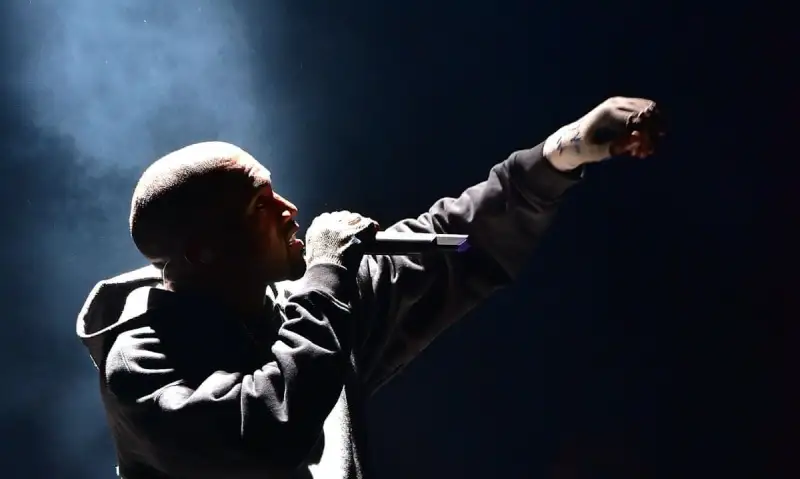
Kanye West’s controversies are as diverse as his discography, ranging from interrupting Taylor Swift at the VMAs to his polarising foray into politics. Each chapter of West’s public life seems to be accompanied by a wave of debate, challenging his fans and detractors to reconsider the boundaries between genius and eccentricity. His outspoken nature, while often leading to backlash, also forces conversations on race, celebrity, and mental health, particularly in the context of his own bipolar disorder diagnosis. West’s journey underscores the complex relationship between an artist’s work and their personal life, questioning where one ends and the other begins. Although his musical genius is undeniable, with each album pushing boundaries and setting new standards, even as his personal life and public statements spark debate and controversy.
Marilyn Manson: The Antichrist Superstar
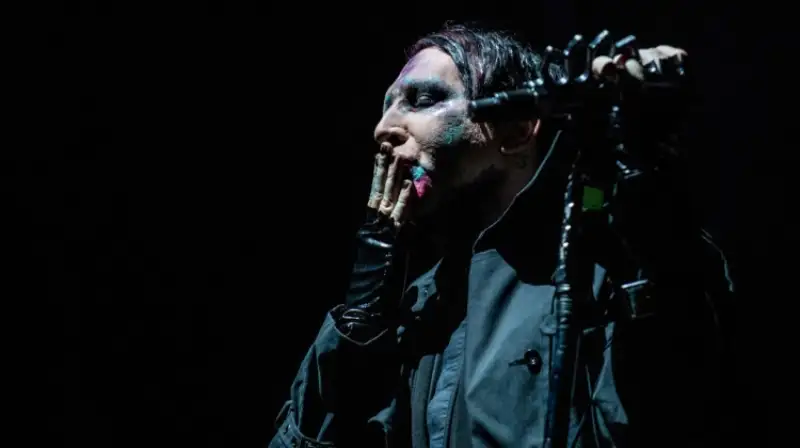
Marilyn Manson emerged in the ’90s as the self-proclaimed Antichrist Superstar, challenging societal norms and religious conventions with his music and persona. He soon became the poster child for 90s moral panic, with his music and image accused of inspiring everything from violence to satanism. Yet, this music controversy often overshadowed the critique embedded in Manson’s work, which aimed to mirror and mock the very societal norms he was accused of undermining. His provocative use of religious and sexual imagery wasn’t just for shock value but was a deliberate attempt to challenge the hypocrisy and censorship of mainstream culture. Yet, Manson’s artistry lies in his ability to mirror society’s darkness, forcing us to confront our fears and prejudices.
Michael Jackson: The Troubled King of Pop
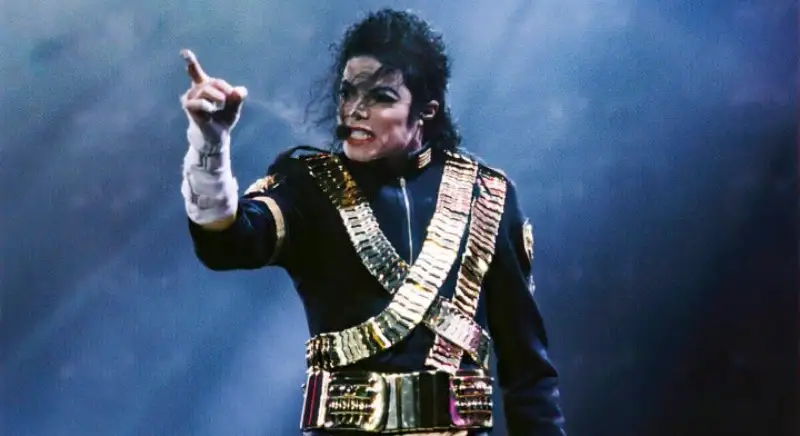
Michael Jackson’s controversies are perhaps among the most heart-wrenching, given his monumental impact on music and culture. Michael Jackson’s unparalleled contributions to music and dance make him one of the most celebrated artists in history. However, his life was riddled with controversies, from his changing appearance to serious allegations that clouded his legacy. The allegations of child abuse against him cast a long shadow over his legacy, leading to a media frenzy and public divide that persists to this day. Jackson’s life story, from his troubled childhood to his battles with the media, illustrates the dark side of fame and the often-destructive nature of public scrutiny. His musical achievements and humanitarian efforts offer a stark contrast to the controversies, presenting a complex figure whose legacy is still being debated.
Britney Spears: The Pop Princess in the Eye of the Storm
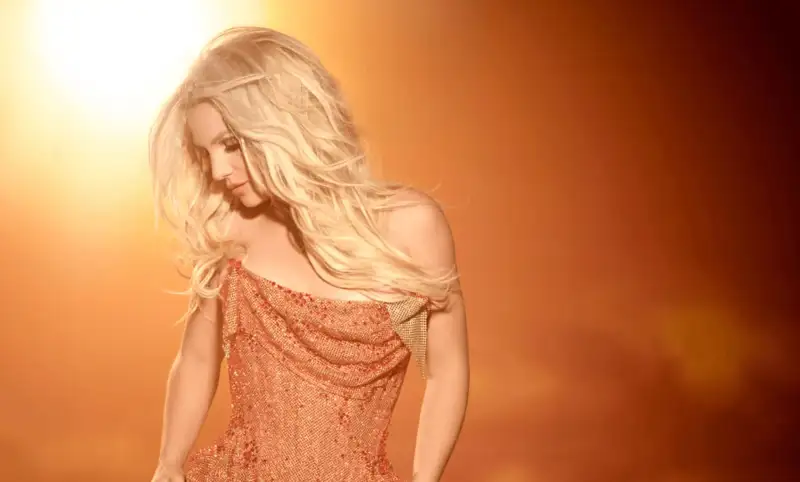
Britney Spears’ journey from teenage pop sensation to a symbol of the fight for personal autonomy speaks volumes about the cost of fame in the modern world. Spears, who entered the limelight at a young age, became the quintessence of pop music success in the late ’90s and early 2000s. Although after a series of public mental breakdowns post her alleged breakup with popstar Justin Timberlake, Britney was not seen in the public eye for quite some time.
Britney Spears’ conservatorship battle thrust her back into the global spotlight, not as a pop icon, but as a symbol of the fight for personal autonomy. The #FreeBritney movement, fueled by fans and social media, brought attention to the often-opaque world of conservatorships, sparking debates about mental health, celebrity, and the rights of individuals under the care of others. Spears’ legal victory and the subsequent media coverage shed light on the pressures faced by child stars and the long-term impacts of living in the public eye, making her story a rallying cry for reform and awareness. Britney Spears became a global sensation, embodying the dreams and aspirations of a generation. Yet, her journey through fame was fraught with challenges, from intense media scrutiny to a highly publicized personal life.
Madonna: The Queen of Reinvention
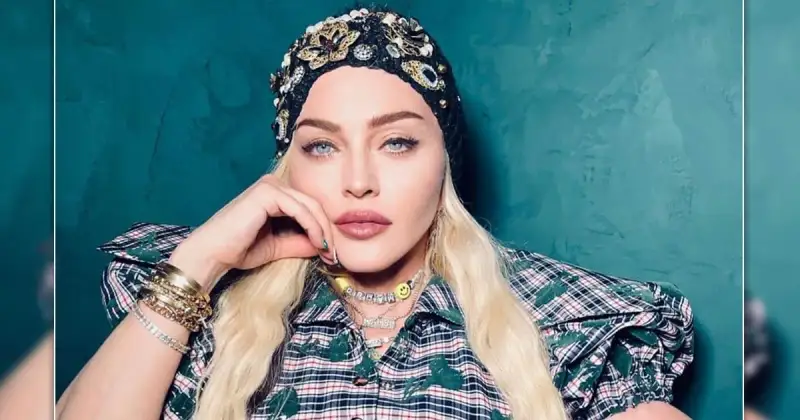
Madonna’s career is a playbook on how to use controversy to one’s advantage, making her one of the most iconic outrageous musicians of her time. From the “Like a Prayer” music video, which blended religious imagery with sexual overtones, sparking outrage from the Vatican and religious groups to the “Sex” book, a bold exploration of sexual fantasies and freedom, Madonna has never shied away from pushing boundaries. Her provocations are not gratuitous but rather a deliberate challenge to societal norms regarding sexuality, gender, and freedom of expression. Madonna’s ability to continually reinvent herself, while remaining at the forefront of conversations about feminism and artistic freedom, showcases her unparalleled knack for navigating and capitalizing on the controversies that have followed her throughout her career.
The Rolling Stones: Rock’s Enduring Rebels
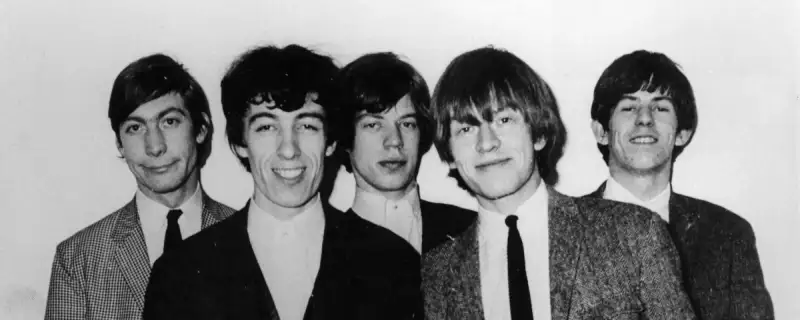
The Rolling Stones personify rock and roll rebellion, solidifying their status as one of the most infamous bands in the genre’s history. They embody rock’s sex, drugs, and rock and roll ethos. The Rolling Stones’ controversies often mirrored the tumultuous times they lived through. Their music, with hits like “Sympathy for the Devil” and “Street Fighting Man,” became anthems for a generation questioning authority and pushing for social change. The band’s off-stage antics and brushes with the law only fuelled their rebellious image, making them the embodiment of rock and roll’s defiance. The Stones’ longevity and continued relevance speak to their ability to adapt and evolve, using controversy not just for shock value but as a reflection of the times, challenging listeners to confront their own beliefs and the world around them.
The Sex Pistols: Punk’s Incendiary Icons
![]()
The Sex Pistols burst onto the scene in the late ’70s, igniting a punk revolution with their raw sound and anarchistic ethos. The Sex Pistols’ brief but explosive career was a meteoric rise and fall that left an indelible mark on the music world. Their provocative performances ignited the punk movement, challenging the status quo and inspiring a generation to question authority. Their single “God Save the Queen” was seen as a direct attack on the British establishment, leading to widespread bans and outrage. Yet, it was this very ability to provoke that propelled them into the annals of music history. The Sex Pistols challenged the music industry’s conventions and inspired a generation to question authority, embodying punk’s do-it-yourself spirit.
The Doors: The Poets of the Psychedelic Era
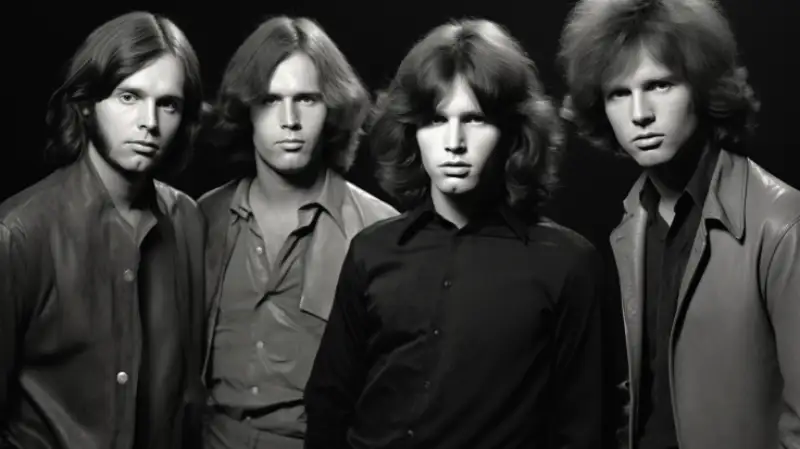
The Doors, led by the enigmatic Jim Morrison, known as the Lizard King for his wild antics, carved a niche in the psychedelic era with their dark, poetic explorations of life, death, and everything in between. Their music, especially tracks like “The End,” with its haunting refrain “Father, yes son? I want to kill you,” pushed the boundaries of acceptable themes, delving deep into the murkier waters of the human psyche. This fearless journey into taboo subjects set them apart in an era dominated by the peace and love ethos, making them the beacon for those seeking depth in the chaos of the ’60s and ’70s. The Doors’ defiance was on full display during their appearance on the Ed Sullivan Show, where they refused to censor the lyrics to “Light My Fire,” leading to their ban from the show but cementing their reputation as uncompromising artists. Their controversies, from Morrison’s Miami arrest to their stand on artistic integrity, serves as a powerful testament to the role of art in challenging the status quo and provoking thought.
Eminem: The Rap God’s Contentious Reign
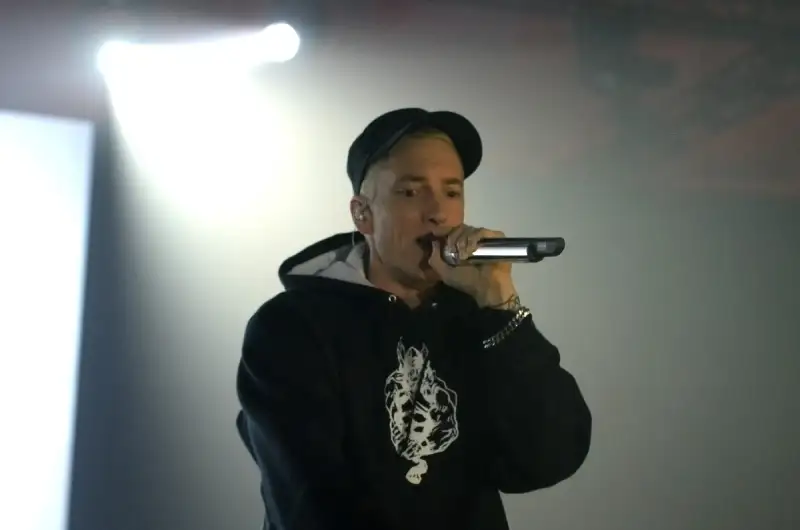
Eminem, often hailed as the Rap God, catapulted into the limelight in the late ’90s with a blend of razor-sharp wit and unapologetically raw lyrics that took aim at the music industry and societal norms alike. His early work, notorious for its haunting narratives filled with murderous intent towards his then-wife, Kim, exemplified his fearless approach to storytelling. Eminem’s penchant for controversy didn’t end there; he famously skewered celebrities like Michael Jackson and Madonna, and didn’t spare politicians such as Sarah Palin and George Bush, using his music as a platform to mock and critique with equal fervour. Despite his battles with drug abuse and the backlash over his provocative themes, Eminem has navigated the stormy waters of controversy with unparalleled skill. His introspective examination of personal demons, alongside a knack for voicing the disenchantment felt by many, has not only secured his throne in hip-hop royalty but also solidified his legacy as the genre’s Greatest Of All Time (G.O.A.T.), demonstrating a resilience and adaptability that few can claim to possess.
Conclusion
In the cacophony of voices that make up the music industry, these artists stand out not just for their undeniable talent, but for their willingness to confront, provoke, and challenge. Their careers are marked by moments of brilliance and madness, capturing the hearts of fans and the ire of critics. They remind us that art is not just a reflection of the times but a force that can challenge and change them. The controversies that surround these icons are as much a part of their legacy as their music, each scandal, and spectacle, a note in the symphony of their careers.
As we look back on the paths they’ve carved, it’s clear that the relationship between controversy and creativity is a complex dance. It’s about pushing boundaries, challenging norms, and, ultimately, sparking conversation. These musicians and bands didn’t just make music; they made history, painting their names in bold strokes across the canvas of popular culture.
In the end, the sound of controversy is as varied as the artists who produce it. It’s a testament to the power of music to provoke, inspire, and, yes, sometimes even offend. Above all, it’s a reminder that in the hands of true artists, controversy is not just noise but a melody that resonates through the ages, challenging us to listen, think, and maybe even change the station.
